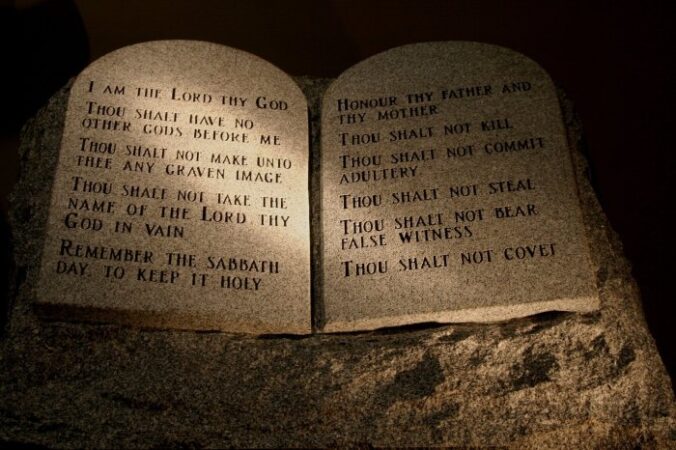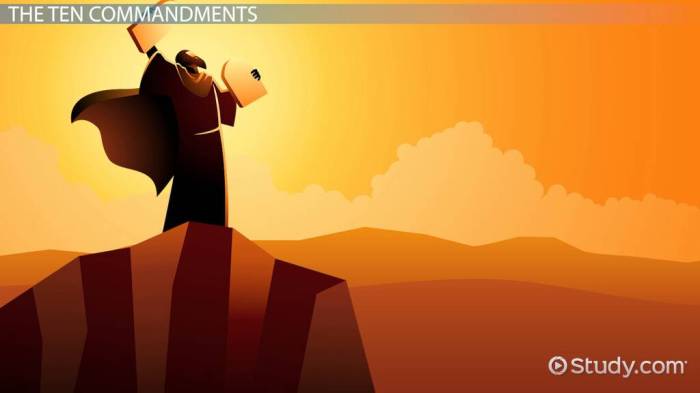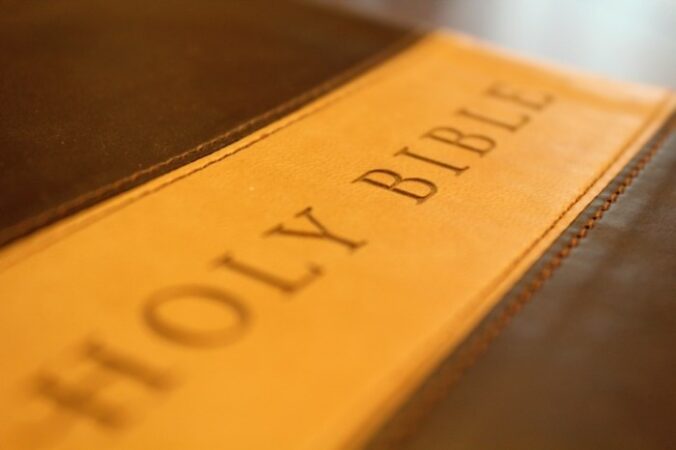
What is the Mosaic Law? It’s a question that has fascinated scholars and theologians for centuries. This ancient set of laws, attributed to Moses, forms the foundation of Jewish religious and legal practice. From its origins in the time of the Exodus to its enduring influence on Jewish culture and tradition, the Mosaic Law has shaped the lives of countless individuals.
The Mosaic Law, also known as the Torah, comprises a vast collection of rules and regulations covering every aspect of life, from religious rituals and dietary restrictions to civil and criminal justice. These laws, passed down through generations, provide a framework for living a righteous and fulfilling life according to Jewish principles.
The Origins of the Mosaic Law: What Is The Mosaic Law
The Mosaic Law, also known as the Torah, is a collection of laws and teachings attributed to Moses, the prophet who led the Israelites out of slavery in Egypt. It forms the foundation of Jewish law and has had a profound influence on Christianity and Islamic law.
The Historical Context
The Mosaic Law originated during the time of the Israelites’ exodus from Egypt, which is estimated to have occurred around the 13th century BCE. This period marked a pivotal moment in the history of the Israelites, as they transitioned from a state of slavery to a nomadic life in the wilderness. The laws given to Moses were intended to guide the Israelites in their journey toward the Promised Land and to establish a covenant between them and God.
The Relationship Between the Mosaic Law and the Ten Commandments
The Ten Commandments, which are often considered the core principles of the Mosaic Law, were given to Moses on Mount Sinai. These commandments serve as a foundational set of moral and ethical guidelines that underpin the broader Mosaic Law. They emphasize the importance of monotheism, respect for God, and ethical conduct in relationships with others.
The Key Themes and Principles of the Mosaic Law
The Mosaic Law encompasses a wide range of topics, including religious practices, social justice, family law, and criminal law. Some of the key themes and principles that run through the Mosaic Law include:
- Monotheism: The Mosaic Law emphasizes the belief in one God, who is the creator and ruler of the universe. It forbids the worship of any other gods or idols.
- Justice and Equity: The Mosaic Law promotes social justice and equity, emphasizing the need to protect the vulnerable and to treat all people with fairness.
- Holiness: The Mosaic Law calls for the Israelites to live a life of holiness, which involves separating themselves from sin and pursuing a relationship with God.
- Covenant: The Mosaic Law establishes a covenant between God and the Israelites, in which God promises to bless them if they obey his laws, and to punish them if they disobey.
- Ritual Purity: The Mosaic Law includes a complex system of ritual purity, which governs aspects of daily life such as food, clothing, and bodily functions.
- Sacrifice: The Mosaic Law prescribes various sacrifices, both animal and vegetable, as a means of seeking atonement for sin and expressing gratitude to God.
Key Components of the Mosaic Law

The Mosaic Law, also known as the Law of Moses, is a complex body of laws and regulations that formed the basis of ancient Israelite society. It encompassed various aspects of life, from religious practices to civil and criminal matters. These laws were given to Moses by God on Mount Sinai and were recorded in the first five books of the Hebrew Bible, known as the Torah.
Civil Law
Civil laws within the Mosaic Law regulated various aspects of daily life, including property rights, contracts, and family relationships. They aimed to establish order and justice within Israelite society.
- Property Rights: The Mosaic Law defined clear guidelines for ownership and inheritance of land, livestock, and other possessions. For instance, the law prohibited the permanent sale of ancestral land, ensuring that it remained within the family.
- Contracts: The law provided regulations for entering into contracts, ensuring fairness and accountability. For example, it stipulated that loans should be repaid with interest, but not excessive interest, to protect the borrower from exploitation.
- Family Relationships: The Mosaic Law Artikeld responsibilities and obligations within families, including the roles of husbands, wives, parents, and children. For example, it emphasized the importance of honoring parents and prohibited adultery and incest.
Criminal Law
The Mosaic Law established a system of criminal justice, outlining punishments for various offenses. This system aimed to deter crime, protect the innocent, and ensure justice for all.
- Theft: The Mosaic Law prescribed different punishments for theft, depending on the value of the stolen goods. For instance, stealing a sheep was punishable by restitution, while stealing a person was a capital offense.
- Murder: The law considered murder a serious crime, punishable by death. It also Artikeld the concept of blood revenge, where the family of the victim had the right to avenge the murder.
- Adultery: Adultery was a serious offense, punishable by death for both the adulterer and the adulteress. This law aimed to protect the sanctity of marriage and prevent societal disruption.
Religious Law
Religious laws constituted a significant portion of the Mosaic Law, focusing on the worship of God and the maintenance of a sacred relationship with him.
- Sabbath Observance: The Mosaic Law commanded the observance of the Sabbath, a day of rest and worship, setting aside one day out of seven for spiritual reflection and communion with God.
- Dietary Laws: The law established specific dietary regulations, prohibiting the consumption of certain animals, such as pigs and shellfish. These laws had both religious and hygienic implications, symbolizing purity and preventing disease.
- Festivals: The Mosaic Law mandated the observance of various festivals throughout the year, such as Passover, Pentecost, and Tabernacles. These festivals commemorated significant events in Israel’s history and served as occasions for spiritual renewal and communal celebration.
Ceremonial Law
Ceremonial laws involved rituals and practices that symbolized and reinforced the Israelites’ covenant relationship with God. They provided a framework for worship and helped to maintain their identity as a chosen people.
- Sacrifices: The Mosaic Law prescribed various types of sacrifices, including burnt offerings, peace offerings, and sin offerings. These sacrifices served as a means of atonement for sins, expressing gratitude, and seeking God’s favor.
- Purity Laws: The law established rules for maintaining physical and ritual purity, including guidelines for dealing with bodily fluids, childbirth, and contact with the dead. These laws aimed to promote physical health and spiritual cleanliness.
- Temple Rituals: The Mosaic Law Artikeld specific rituals to be performed at the temple, such as the daily sacrifices, the annual Day of Atonement, and the Feast of Tabernacles. These rituals served to sanctify the temple as a place of worship and to connect the Israelites with God’s presence.
The Role of the Covenant
The Mosaic Law was intimately connected to the covenant relationship between God and the Israelites. It served as a means of establishing and maintaining this covenant.
“If you obey my decrees and are careful to follow my commands, I will give you rain in its season, and the land will yield its crops and the trees of the field will bear their fruit. Your threshing will continue until grape harvest, and your grape harvest will continue until planting time. You will live in safety in your land, and I will give you peace.” (Leviticus 26:3-6)
The Mosaic Law Artikeld the terms of the covenant, specifying the blessings that would come to the Israelites if they obeyed God’s commands and the consequences of disobedience. This emphasis on obedience and faithfulness underscored the importance of the covenant relationship.
The Impact of the Mosaic Law

The Mosaic Law, also known as the Torah, has profoundly shaped Jewish culture and tradition, serving as a foundational pillar of Jewish identity and practice. It has influenced not only religious beliefs and practices but also social, legal, and ethical norms, leaving an enduring legacy on Jewish life and beyond.
Influence on Jewish Culture and Tradition
The Mosaic Law has been a central force in shaping Jewish culture and tradition. It provides a comprehensive framework for Jewish life, encompassing religious, social, legal, and ethical aspects. The law’s impact on Jewish culture is evident in various aspects:
- Religious Observance: The Mosaic Law lays out detailed guidelines for religious practices, including prayer, dietary laws, Sabbath observance, and festivals. These practices have become integral to Jewish life, shaping religious rituals and shaping daily routines.
- Social Norms: The law also addresses social issues, such as family relationships, property rights, and justice. These provisions have influenced Jewish social norms, shaping family structures, legal systems, and ethical values.
- Ethical Principles: The Mosaic Law emphasizes ethical principles, such as justice, compassion, and righteousness. These principles have informed Jewish ethical thinking and guided moral conduct throughout history.
- Cultural Identity: The Mosaic Law has served as a unifying force, providing a shared set of beliefs and practices that have contributed to Jewish cultural identity. It has been a source of continuity and resilience for Jewish communities across time and space.
Comparison with Other Ancient Legal Systems
The Mosaic Law, while rooted in ancient Near Eastern legal systems, exhibits unique characteristics. It differs from other ancient legal codes in several key aspects:
- Emphasis on Ethical Principles: Unlike many ancient legal systems focused on retribution and punishment, the Mosaic Law emphasizes ethical principles such as justice, compassion, and righteousness. This ethical focus sets it apart from other legal codes of its time.
- Emphasis on Social Justice: The Mosaic Law contains provisions promoting social justice, such as protecting the rights of the poor, the widow, and the orphan. This focus on social justice distinguishes it from other ancient legal systems that often prioritized the interests of the powerful.
- Emphasis on Ritual Purity: The Mosaic Law includes extensive regulations regarding ritual purity, which are less prominent in other ancient legal systems. This emphasis on ritual purity reflects the importance of holiness and separation from the profane in Jewish tradition.
Lasting Legacy in Judaism and Christianity
The Mosaic Law has had a profound and lasting impact on both Judaism and Christianity. Its legacy is evident in various aspects:
- Judaism: The Mosaic Law remains the foundation of Jewish religious and legal practice. It is studied, interpreted, and applied in Jewish communities worldwide. The law’s principles continue to shape Jewish beliefs, practices, and ethical values.
- Christianity: While Christians do not adhere to the Mosaic Law as a binding legal code, they acknowledge its importance as a foundational text in their faith. The law’s ethical teachings, particularly those related to love, compassion, and justice, have been influential in Christian thought and practice.
The Mosaic Law in Modern Times
The Mosaic Law, while rooted in ancient times, continues to exert a profound influence on contemporary Jewish communities. Its teachings and principles are interpreted and applied in diverse ways, reflecting the evolving needs and perspectives of modern society. The Mosaic Law’s relevance in the 21st century is a testament to its enduring wisdom and adaptability.
Interpretations and Applications of the Mosaic Law in Contemporary Jewish Communities, What is the mosaic law
The Mosaic Law, also known as the Torah, is a fundamental text in Judaism. It contains a vast array of laws, rituals, and ethical teachings. Contemporary Jewish communities approach the interpretation and application of the Mosaic Law with a nuanced and dynamic perspective. Orthodox Jewish communities tend to adhere to a more traditional interpretation of the Mosaic Law, while Reform and Conservative Jewish communities may adopt a more liberal and contextual approach.
- Halakha: Halakha, the body of Jewish law, is derived from the Mosaic Law and is constantly evolving. Rabbis and scholars engage in ongoing debates and discussions to determine the contemporary relevance of ancient laws in the context of modern life. For instance, the application of dietary laws (kashrut) in a globalized world where food sourcing and processing are complex presents unique challenges.
- Modern Ethical Challenges: The Mosaic Law’s emphasis on justice, compassion, and social responsibility resonates strongly in the 21st century. Jewish communities grapple with contemporary ethical issues such as environmental sustainability, social inequality, and the rights of marginalized groups. The principles of the Mosaic Law, such as the prohibition of theft and the obligation to help the poor and vulnerable, provide a framework for addressing these challenges.
- Diversity of Interpretations: The Mosaic Law is not a monolithic set of rules. It allows for a range of interpretations and applications. This diversity is reflected in the various branches of Judaism, each with its own unique approach to the Mosaic Law. For example, the debate surrounding the role of women in Jewish life is an ongoing one, with different communities holding varying interpretations of the Mosaic Law’s teachings on gender roles.
Ethical and Social Implications of the Mosaic Law in the 21st Century
The Mosaic Law’s ethical and social implications are far-reaching and continue to shape Jewish thought and practice in the modern world. The law’s emphasis on social justice, compassion, and ethical conduct provides a framework for navigating the complexities of contemporary life.
- Social Justice and Equality: The Mosaic Law’s teachings on justice and equality are highly relevant in a world marked by social inequality and discrimination. The law’s emphasis on treating all people with respect and dignity regardless of their background, status, or beliefs serves as a powerful reminder of the importance of social justice.
- Environmental Stewardship: The Mosaic Law’s emphasis on respecting the natural world is increasingly relevant in the face of environmental challenges. The law’s teachings on responsible land use and conservation of natural resources provide a framework for promoting sustainable practices.
- Interfaith Dialogue: The Mosaic Law’s emphasis on ethical conduct and respect for others is crucial for fostering interfaith dialogue and understanding. The law’s teachings on hospitality and the importance of treating strangers with kindness provide a foundation for building bridges between different religious communities.
Areas of Ongoing Debate and Relevance
The Mosaic Law continues to be a subject of debate and discussion within Jewish communities, particularly in areas where its teachings intersect with contemporary social and ethical issues.
- Modern Medical Advancements: The Mosaic Law’s teachings on the sanctity of life and the prohibition of taking a life are relevant to contemporary medical advancements, such as abortion and euthanasia. Jewish communities engage in ongoing debates about the ethical implications of these practices.
- LGBTQ+ Rights: The Mosaic Law’s teachings on sexuality and gender roles are subject to ongoing debate in the context of LGBTQ+ rights. Some Jewish communities have adopted a more inclusive stance, while others adhere to more traditional interpretations.
- Global Justice and Human Rights: The Mosaic Law’s emphasis on justice and compassion has implications for global issues such as poverty, war, and human rights. Jewish communities are actively engaged in advocating for social justice and human rights around the world.
Final Conclusion

The Mosaic Law, a testament to the enduring power of faith and tradition, continues to resonate in the modern world. While its specific applications may be debated, the underlying principles of justice, compassion, and ethical conduct remain relevant and inspire countless individuals. Whether you’re exploring the history of Judaism, seeking a deeper understanding of Jewish culture, or simply curious about the ancient world, the Mosaic Law offers a fascinating and complex journey into the heart of Jewish belief and practice.
Essential FAQs
What is the difference between the Mosaic Law and the Ten Commandments?
The Ten Commandments are a subset of the Mosaic Law, representing the core moral principles of the Law. The Mosaic Law encompasses a broader range of laws, including civil, criminal, religious, and ceremonial regulations.
Is the Mosaic Law still relevant today?
The relevance of the Mosaic Law is a matter of ongoing debate within Jewish communities. While some aspects of the Law are no longer practiced literally, many of its core principles, such as ethical conduct and social justice, continue to be relevant and influential.
How is the Mosaic Law interpreted in modern times?
The interpretation of the Mosaic Law varies among different Jewish groups and scholars. Some emphasize literal adherence to the text, while others favor a more nuanced approach that considers historical context and contemporary realities.


